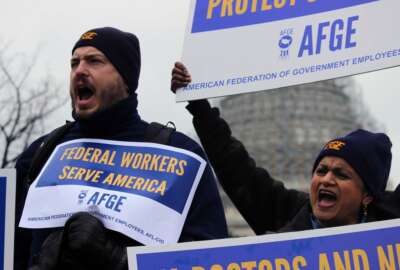
Trump admin requests expedited appeal of EO decision, as VA petitions accountability ruling
Citing "governmentwide reach," the Trump administration requested an expedited briefing in its appeal of the federal district court's injunction of the president's...
The Trump administration is appealing two separate decisions that could impact how agencies discipline and remove poor performers.
Both a federal district judge and an independent arbitrator independently ruled in favor of federal unions, but recent appeals and motions from the administration on two separate occasions show that unions’ battles over the administration’s efforts to more quickly fire poor performers are far from over.
The Trump administration last week announced its plans to appeal a federal district judge’s Aug. 24 decision that invalidated nine key provisions of the president’s executive orders on collective bargaining, official time and employee removals.
And late last week, attorneys at the Justice Department requested an expedited briefing schedule before the U.S. Court of Appeals for the District of Columbia Circuit. The court should more quickly consider the administration’s appeal, the Justice Department argued, because the federal district court’s injunction has “governmentwide reach.”
“Prompt resolution is especially needed in light of the ongoing effects of the permanent injunction on agency management and collective bargaining throughout the federal government, and in light of the effect the injunction has on the president’s ability to supervise the conduct of his subordinates in the executive branch,” the attorneys wrote in a Sept. 27 motion.
The Justice Department attorneys want to submit their own briefing by Oct. 26 and give union attorneys until Dec. 7 to submit a consolidate response. Under DoJ’s proposed schedule, the Court of Appeals would finish briefing between the Thanksgiving and Christmas holidays and would hear oral arguments sometime after the New Year.
Union lawyers told DoJ attorneys they opposed the expedited briefing, according to the government’s motion.
VA appeals to FLRA over accountability act
Separately, the Veterans Affairs Department is appealing an independent arbitrator’s decision, which recently determined the agency had violated the terms of its contract with the American Federation of Government Employees (AFGE).
Specifically, the arbitrator found merit in AFGE’s grievance from last September. The union argued the agency used provisions in the VA Accountability and Whistleblower Protection Act to implement new performance management guidance. That guidance, AFGE said, contradicted the collective bargaining agreement VA signed with the agency back in 2011, because it eliminated the need to give employees a chance to improve with a performance improvement plan (PIP).
VA filed exceptions last week to the arbitrator’s decision with the Federal Labor Relations Authority, the agency’s spokesman, Curt Cashour, said.
Now, AFGE has until Oct. 24 to submit its own response to VA’s exceptions, the union’s spokesman said. After October, it’s less clear when FLRA will issue a decision. AFGE said it could take up to a year.
Until then, the arbitrator’s original award isn’t final or binding, Cashour added.
VA’s appeal is significant, because it essentially delays a potentially messy and complicated rehiring process. In its decision, the arbitrator told VA to begin complying with the terms of its collective bargaining agreement with AFGE. Specifically, the arbitrator instructed VA to rescind previously-taken adverse actions or removals that it took against employees for unacceptable performance who didn’t receive a performance improvement plan.
Several VA employees, especially those at the Veterans Benefits Administration, have previously told Federal News Radio they weren’t given an appropriate amount of time to improve their performance. One mistake, they said, could cost them their jobs.
Some members of Congress are paying special attention to the accountability act and its implementation at VA.
Democrats on the Senate VA Committee had expressed similar concerns with VA’s implementation of the new authority and its performance management guidance, citing instances where managers attempted to remove employees for missing a deadline or moving slowly after a workplace injury.
Tamara Bonzanto, VA’s nominee to lead the agency’s new Office of Accountability and Whistleblower Protection (OAWP), told the Senate committee in her confirmation hearing that the office wasn’t yet a trusted entity among employees at the department.
The House VA Committee heard from the department last month, which insisted it wasn’t using the new accountability legislation to to disproportionately fire lower-ranking employees over senior managers and executives.
The VA inspector general is also reviewing the department’s implementation of the accountability act.
Additional focus on VA’s implementation of the accountability act may be critical in the coming months, especially as the Trump administration looks for best practices and considers new alternatives to discipline poor performers.
Copyright © 2025 Federal News Network. All rights reserved. This website is not intended for users located within the European Economic Area.
Nicole Ogrysko is a reporter for Federal News Network focusing on the federal workforce and federal pay and benefits.
Follow @nogryskoWFED
Related Stories
 Exclusive
Exclusive 



